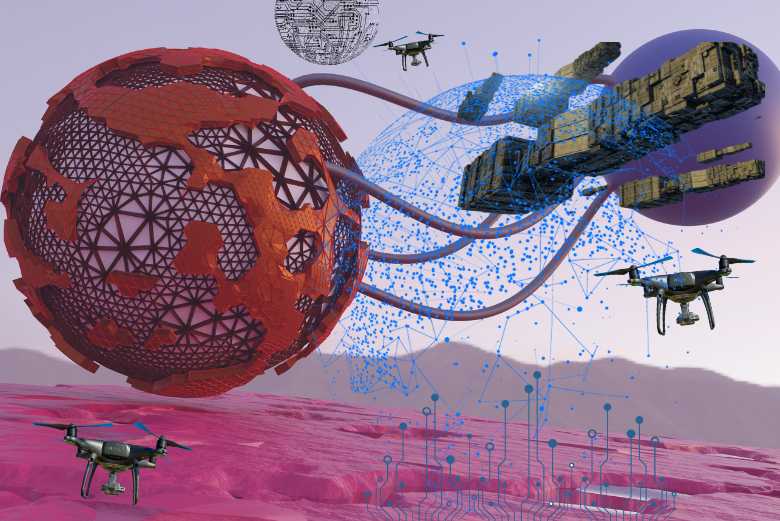The tech world is obsessed with profit and that obsession is showing symptoms of an unsettling pattern, the exploitation of human vulnerability disguised as technological innovation and progress. This article presents three compelling examples: the militarization of AI, the creeping influence of centralised finance on decentralised finance, and the rise of unemployment-tech. Together they illustrate how tech’s potential to solve problems is being overshadowed by its use as a tool for control and exploitation for profit.
What is the true cost of innovation? In our service as instruments of change through technological innovation, who are we serving? In an age where technology promises to transform lives for the better, we must nevertheless be rigorous about the deeper truth and ask, at whose expense?
1. Big Tech Militarisation
One of the most troubling trends in tech is the co-opting of artificial intelligence (AI) and robotics by the military-industrial complex. Drones and robotic systems that were first imagined as tools for improving human life have been repurposed for industrial-scale killing and surveillance. The growing trend of AI-enabled warfare, where decision-making is increasingly automated, threatens to push humanity into a new era of conflict and destruction.

Drones, for instance, have evolved from simple surveillance tools to remote-controlled weapons, capable of executing military missions with minimal human oversight. What started as innovations meant to aid and assist has now become an integral part of global warfare, used not only for national security and defence but also for targeted killings and mass-scale destruction. These technologies, once driven by the desire to protect and improve lives, now contribute to the war machines of powerful nations.
Tech as Instruments of Surveillance, Oppression & Death
The irony is that many of these AI-driven systems were originally sold to the public as tools for improving daily life. But the darker truth is that these advancements have been funnelled into military applications, turning tech into instruments of oppression and death. The development of AI and robotics for military purposes reflects the grotesque distortion of tech’s potential.
War, especially in its modern, AI-driven form, presents an existential threat that can unravel societies at an unprecedented rate. Industrial-scale killing and AI-driven genocide may soon overshadow the environmental crises we face, as the weapons of tomorrow will be capable of unparalleled destruction.

The global arms race for AI-enabled warfare shows that the more powerful the technology, the more dangerous it becomes when profit and geopolitical interests take precedence over human dignity for all.
2. Central Finance’s (Ce-Fi) Creeping Influence on Decentralised Finance (De-Fi)
If AI is being weaponised, decentralised finance (De-Fi)—another revolutionary technology—is under siege in a different way. Once a beacon of financial freedom, De-Fi is being infiltrated by the very centralised financial powers it was designed to oppose. What was meant to empower individuals is now being distorted into a new avenue for the financial elite to consolidate control.
As a strong advocate of De-Fi, one of the most alarming developments is the growing influence of centralised financial powers (Ce-Fi) on decentralised finance. The original promise of De-Fi was to decentralise financial systems and free them from the hands of a select few, empowering individuals with autonomy over their own assets. Yet, we are seeing the very players responsible for abuses within centralised finance now positioning themselves as dominant forces in the De-Fi space.
Recently, investigative journalist Whitney Webb highlighted how many of the individuals and institutions tied to Ce-Fi abuses have begun purchasing vast amounts of Bitcoin and other crypto assets. While Bitcoin was once seen as a tool to escape the manipulations of centralised banking systems, the influx of these large financial players signals the potential for a coup d’état within the De-Fi ecosystem.
This shift is deeply concerning because it suggests that the same forces which profited from financial interference and manipulation within Ce-Fi are now moving to exert similar control over the De-Fi space. What was meant to be a democratised system may soon become just another avenue for the financial elite to consolidate power, if not resisted.
True Decentralisation as the Future
If De-Fi start-ups want to succeed in creating meaningful impact, they must uphold the principles of true decentralisation. This means building platforms where a representative community has control, where transparency is baked into the system and where no single entity can accumulate enough power to dictate the terms. This model isn’t just a theoretical ideal, it’s necessary if we are to prevent De-Fi from becoming Ce-Fi 2.0.
Moreover, embracing these principles of decentralisation can have broader applications beyond finance. In sectors like media, healthcare and education, decentralised models can foster more equitable access and distribution, empowering individuals and communities rather than corporations and oligarchs.
3. Unemployment-Tech: Profiting off Pain
Have you noticed how the “Unemployment-Tech” industry is booming? Ironically, at the same time, global unemployment rates are soaring – why? Instead of solving the root causes of unemployment, a new breed of start-ups has emerged to profit off the unemployed and underemployed. These platforms claim to help job seekers find employment but often force them into paying for basic services like viewing job listings or applying for vacancies.
In a world where technology should be easing the burden of joblessness, it’s doing the opposite – placing yet another barrier between people and employment. These platforms don’t ask, “How can we solve the problem of unemployment?” Instead, they ask, “How can we profit off this problem?” – and this is the fundamental flaw.
Pay to Play: The Cost of Job Seeking
Unemployment-Tech thrives on the desperation of the jobless, charging for services that were once freely available. Want to see the full job listing? Pay. Want to apply for multiple positions? Subscribe. Want more eyeballs to see your profile? Upgrade. This shift means that for many, it’s no longer just a matter of finding work—it’s about affording to search for work in the first place.
The industry profits from the underemployed by positioning itself as a “middleman,” monetizing access to job postings and filtering candidates based on their ability to pay for premium services. The harder it becomes to land a job, the more these platforms rake in from people struggling to make ends meet.

The boom in unemployment-tech reflects a broader trend in how start-ups approach real-world problems. Instead of seeking to solve unemployment, they exploit it. Take, for example, platforms that charge candidates for resume evaluations, “premium” application packages or exclusive job prospects. These services often offer no real advantage in landing a job but create a pay-to-play system that preys on the job seeker’s anxiety and financial insecurity.
A Missed Opportunity for Real Change
The irony here is that tech has the potential to democratize access to jobs, create new types of work and bridge gaps in employment. The rise of “Unemployment-Tech” is just one example of what happens when start-ups prioritize profit over social impact. This mindset isn’t limited to job platforms – it pervades the broader tech ecosystem, fuelling cycles of exploitation rather than empowerment innovation. There are alternative models for success – models where tech start-ups don’t just extract value, but create it by genuinely solving real-world problems.

The Fork in the Road
The tech industry stands at a crossroads. On one path lies a future where innovation is driven by profit, power, exploitation and control. On the other, there is the promise of technology as a force for good—one that solves problems, empowers individuals, and fosters equity.
The choices made by today’s start-ups will shape the world of tomorrow. Will they continue to profit off pain, commodifying human vulnerability, or will they create systems that empower, upgrade and democratise?
It is not too late to choose the latter. What the world needs now is technology that bridges divides, restores dignity and addresses the root causes of human suffering. Only by shifting the focus from profit to purpose can we harness tech’s true potential and build a future where human dignity and respect for life, not wealth, is the ultimate goal.




